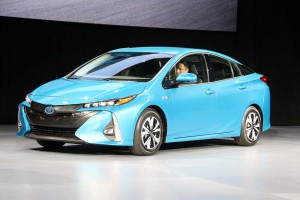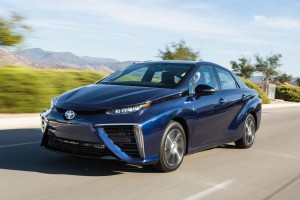Ever more restrictive environmental rules in markets around the world has Toyota Motor Corp. sending reinforcements to its hybrid and electric vehicle teams, according to top company executives.
The automaker said Tuesday it plans to grow its gasoline-hybrid technology team during the next five years to accelerate development and introduction of new lower-emission engines.
The automaker is also trying to speed up the development of its longer-range battery-electric vehicles, which marks a change from its strategy of focusing on hydrogen fuel cell-powered vehicles to meet zero-emission guidelines in several countries.
“We need to take an aggressive approach to deal with changing regulations,” Toshiyuki Mizushima, president of Toyota’s powertrain division, said during a recent media briefing.
Countries like China and the United States are pushing tougher and tougher emissions regulations and fuel economy rules – although that may change with the Trump administration – forcing the automaker to play catch up.
(Toyota goes back to drawing board for next-gen Camry. For more, Click Here.)
Toyota plans to expand its hybrid technology development team by 30% through 2021, officials explained. By the time the additions arrive, the automaker hopes to introduce 19 new lower-emission powertrain components made on its recently introduced common manufacturing platform.
The result will be that at least 60% of the vehicles sold in Japan, Europe, China and the U.S. by 2021 will use new components that will reduce carbon dioxide emissions by more than 15% compared with last year’s models.
This new era comes as Toyota continues to feel the pinch to produce more and more electric vehicles. Toyota was late to the battery-electric party as it vigorously pursued the fuel-cell path for zero-emissions vehicles.
However, the ongoing refinement of hybrids like the Prius are revealing that batteries may be the path of least resistance when it comes to hitting the zero-emission target.
(Click Here for more about Toyota’s plans for its car line-up.)
Mizushima believes hybrid technology is critical to developing more zero-emission vehicles.
“The core technology of plug-in hybrids and electric and fuel-cell vehicles is based on hybrid technology. By increasing our hybrid team, we can leverage new developments for use in electric powertrains,” he said.
This has forced Toyota to accelerate the development of lower-emission cars. The company appointed President Akio Toyoda to lead a new electric car division to speed up the development of battery-powered cars.
The automaker, which sells around 10 million vehicles a year, has pledged to reduce global average carbon dioxide emissions of its new vehicles by around 90% by 2050, Reuters reported.
(Toyota tumbles; operating profits plunge 43%. Click Here for details.)
Mizushima believes hybrid vehicles to increase, accounting for around 20% of Toyota’s global annual vehicle sales by 2025, from around 10% now, according to Reuters.


